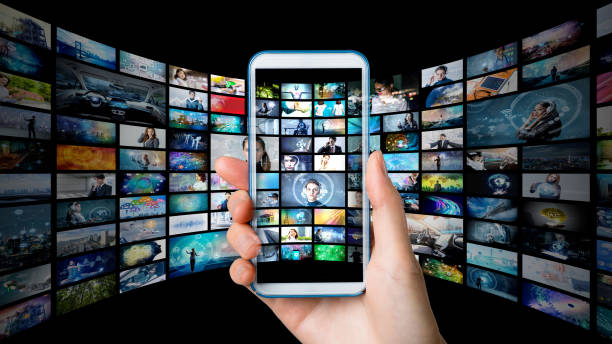How Mobile Phones Changed the World
Before mobile phones were prevalent, if you were running late for a meeting, you’d have to call your colleague to inform them. This caused friction within teams, but now smartphones allow us to communicate quickly and effortlessly.
Joe Hanlon, publisher of smartphone plan comparison site WhistleOut, identified 2015/2016 as being pivotal when cheap data started flooding networks. There was a point when data allowances skyrocketed within plans – leading to massive network congestion at that point in time.
1. They allow you to stay in touch with friends and family
Before mobile phones were invented, people relied solely on word of mouth for updates about the lives of friends and family – something which could prove challenging in remote locations or when travel wasn’t an option. With mobile phones now being more widely used, people can stay in contact with loved ones through internet-enabled applications and remain updated about what their loved ones are up to regularly, as well as ask for advice or give help when feeling alone or need guidance.

How Mobile Phones Have Changed the World For the Better
At the same time, they can use their mobile phones to keep in contact with work colleagues when away for extended business travel or traveling abroad for pleasure. Staying informed of project progress through emails or texts will keep up the momentum within an office.
Long-distance calls were once costly, but now they are much more affordable thanks to smartphones and a host of low-cost plans such as Lifeline programs for low-income families. People even carry multiple phones to take advantage of various calling plans or services offered, like international roaming or discounted local rates.
Social media apps such as WhatsApp or Snapchat make keeping in touch easier than ever, with fast text and photo messaging, as well as dating platforms like Tinder, Hinge, and OkCupid, where people can meet potential partners.
2. They allow you to shop online
Not too long ago, the concept of carrying around a mobile computer on your wrist for calls, weather updates, and internet surfing was seen as completely revolutionary. Since then, mobile phones have revolutionized life like never before. From making payments at checkouts online and making purchases from any location to accessing social media used by many businesses for marketing campaigns, mobile phones have changed how we live our lives in ways never imagined before.
Moore’s Law largely played a pivotal role in the smartphone’s meteoric rise, which stipulates that transistor density on chips should double every two years. This allowed prices of mobile phones to decline quickly as more powerful chips became available and camera technology advanced at an astounding rate; these three factors combined helped push smartphone usage beyond any expectations and into mass market adoption that bewildered industry executives.
Prior to smartphones, finding directions was much harder: finding an actual map was necessary in order to figure out your route. Now, however, with GPS on our phones, we can quickly recalculate if we make an incorrect turn or take the wrong road.
No doubt about it: people who own and use smartphones tend to be happier overall. A large majority of respondents across 11 countries surveyed say their phone has had a positive effect on both their personal lives and on society as a whole.
Smartphones can provide a lifeline to people impacted by local disasters who are isolated, providing text and video updates of what’s going on – this can have a transformative impact on those involved.
3. They allow you to play games
Long before smartphones came along, if you wanted to play games on your phone, you had to plug an actual game cartridge in. But with the Nokia N-Gage’s high resolution and full-color display as well as an advanced graphics processor, mobile gaming took on new heights.
Not just children loved mobile gaming – adults could get involved, too. From trying to beat your high score or smashing those pesky pigs in Angry Birds, mobile gaming has never been more popular than it is now.
As smartphone technology has advanced, so have its apps and features. The iPhone revolutionized this area of mobile technology, turning smartphones into a Swiss Army knife device capable of doing almost everything. Smartphones have also helped transform society, making it easier for people to stay in contact with friends and family members.
Smartphones can be powerful tools, yet they may also have negative consequences on our health and well-being. Longitudinal scientific studies on how smartphones affect our well-being are just beginning to yield fruit; some surprising findings have already emerged from such studies.
Studies have demonstrated that adolescents who use their phones extensively may have lower academic performance than their counterparts who don’t, believed to be due to increased anxiety caused by using smartphones for work purposes and distracting users from doing work. Other issues may include parental concerns regarding children’s smartphone usage as well as social media apps leading to more excellent appetites for food and alcohol consumption.
Although some experts express reservations about using smartphones, most experts agree that their advantages far outweigh any drawbacks. When Popular Mechanics released its list of “101 Gadgets That Changed the World,” smartphones took first place – beating iconic technologies such as TV, personal computers, and telephones!
4. They allow you to access the internet
At first, mobile Internet access was limited to email and headline news, with small screens lacking graphic capabilities. Over time, however, cellular networks improved and mobile phones evolved into smartphones equipped with more comprehensive internet capabilities that enable people to search the web, read long articles, and view videos all on their mobile phones!
Smartphone adoption was driven by three key drivers: price, camera technology, and what is known as the network effect (whereby value increases exponentially with adoption by more users). Without these factors, smartphones might never have reached mass markets.
Mobile phones have changed our lives dramatically in ways no one could have predicted, bringing people from around the globe closer together through new and exciting channels.
No matter the phone they use – basic, feature, or smart – most people believe mobile phones have had mostly positive effects on their lives and societies worldwide. Lebanese, Jordanians, and Tunisians tend to hold less favorable views about how mobile phones have altered society; Kenyans and South Africans hold positive assessments regarding mobile phones’ impact.
5. They allow you to communicate with others
With the invention of mobile phones came new ways for people to communicate. You could use your phone to call, text, or email others – making it easier than ever to stay in contact with family, friends, and co-workers alike and also being able to reach someone when facing difficulties or seeking assistance.
Mobile phones are convenient, portable devices that allow us to remain in touch with people even if they are far away. Use your phone to stay in contact with anyone who matters to you, even if they’re out of range of the caller!
Mobile phones have revolutionized our communication, enabling us to stay in contact with people worldwide and keep in contact. No wonder mobile phones have become so widespread!
At first, cell phones were costly. Now they’re affordable: basic models start at $25! Thanks to 4G technology, faster data connections than ever are being made possible, making smartphones even more accessible and convenient than before.
Martin Cooper did not anticipate just how revolutionary his invention would become when he created the first cell phone in 1973, but he did know it would change people’s lives worldwide. To him, it simply provided people with an easy way to stay in contact no matter where they were – something landlines or home phones could never do. Since then, this technology has come an incredibly long way; nowadays, most people own cell phones in their pockets 24/7 while being constantly connected online.





